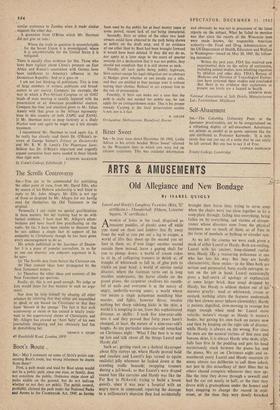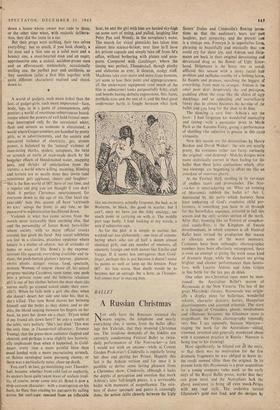ARTS & AMUSEMENTS
Old Allegiance and New Bondage
By ISABEL QUIGLY
Lain-el and Hardy's Laughing Twenties, (Ritz, 'U' certificate.)—Thunderball. (Odeon, Leicester Square, 'A' certificate.) AWORLD of holes in the road, disguised as innocent puddles, of planks sawn off while you stand on them and ladders that fly away from the wall as you put out a leg to escape; a world of lifts that shoot up the second you set foot in them, or, if you linger another second outside them instead, leave a gaping shaft for you to plunge down; a world of cream cakes to sit in, of collapsing trousers to shriek at, of troughs of whitewash to fall in, of .glue pots to trickle on your head; a world of outsize social disaster, where the footman turns out in long woollen underpants, the horse climbs on the grand piano, the carpenter swallows his mouth- ful of nails and everyone is at the mercy of angry, umbrella-waving aunts; a world where riot means a single policeman mouthing blue murder, and fights, however fierce, involve nothing but sharp sidelong kicks in the shin; a world it is tempting to see, from this sophisticated distance, as idyllic: I took five nine-year-olds into it and they proved that forty years hasn't changed, at least, the nature of a nine-year-old's laughs. As my particular nine-ydar-old remarked on Christmas night: 'What I like best is to stay up late and talk about all the things Laurel and Hardy did.'
Such as: getting stuck on a skeletal skyscraper about fifty storeys up, where Hardy proved bold and resolute and Laurel's legs turned to (quite realistic) jelly whenever he looked down at the crawling traffic beneath; swapping trousers during a jail-break, so that Laurel's were draped round him like curtains and Hardy was like the Fat Boy in Pickwick; trying to build a house quietly, since it was near a hospital with an angry nurse in command; repairing the damage to a millionaire's mansion they had accidentally brought their horse into; trying to serve soup when the chairs were too close together to let a soup-plate through; falling into everything, being fallen on by everything, sad victims of circum- stance whose disasters stem from the physical ineptness not so much of them, as of Fate in the form of manhole or bathtap or circular saw.
As we left the cinema we were each given a mask of either Laurel or Hardy. Both are smiling, Laurel with his ancient, long-chinned rueful- ness, Hardy life a reassuring policeman at one who has lost his way. But they are hardly characteristic, these smiles—in the films both are serious and purposeful, busy, easily outraged, in- tent on the job in hand. Laurel occasionally gives a half-smirk of apology or explanation at some larger brick than usual dropped by , Hardy, but Hardy is seldom shaken out of his massive gravity: mud or whitewash, cream or custard, nothing alters the features underneath (the best clowns never behave clownishly). Hardy is patient, dignified, slow-moving in revenge but nippy enough when need be; Laurel more volatile, nature's stooge as Hardy is nature's leader, but getting his own back on nature now and then by keeping on the right side of disaster, while Hardy is always on the wrong. For since fat men are the natural victims of thin men and banana skins, it is always Hardy who skids, trips, falls face first in the pudding and gets his bead mysteriously stuck between the piano leg and the piano. We sat on Christmas night and re- membered every Laurel and Hardy occasion (it seems almost too deliberate to call them jokes), not just in this miscellany of their films but in others chased complete whenever they turn up; like the time they drove through a sawmill and had the car cut neatly in half, or the time they drove with a gramophone under the bonnet and kept stopping to change the record in mid- street, or the time they very slowly knocked
down a house whose owner was rude to them, or the other time when, with majestic delibera- tion, they did the same to a car.
But their props were nothing, their two selves everything: not so much, if you look closely, a fat man and a thin one as a solid man and a bouncy one, a stout-hearted man and an eager, apprehensive one, a stoical, accident-prone man and an effervescent. melancholy, occasionally smiling one, the perfect pair and antithesis, as they somehow (after a first film together with quite different characters) realised and shook down to.
A world of gadgets, each niore lethal than the last; of gadget-girls, each more impersonal—face, body, legs, as in a game of consequences, only prettier; a world of enormous subterranean board- rooms where the powers of evil hold formal meet- ings interrupted only by the occasional whirr, flash and scream as someone is eliminated; a world where Geiger counters are handled by pretty girls, as in advertisements, and the austere and measured violence of electricity, gas, atomic power, is balanced by the 'natural' violence of man-eating sharks, spiders. octopuses, the twist or scrunch or sizzle of man-made death by the hoWelier effects of bloodstained water, snapping jaws, and shrieks of anticipation from the victims; a world where killing, maiming, blinding and torture are so neatly done they invite (and sometimes get) applause, cheers and laughter: this is the film world of 007, hero of 'our time, and a regular old prig you are thought if you don't think it perfect Christmas entertainment for everyone down to the age of six. Our local six- year-olds' hats this season all have 'LICENSED TO across the front, at any rate, so the password to sophistication has filtered down.
Violence is what has come across from the novels more noticeably than anything else, that and the personality of James Bond, hero-killer whom society, with so many official crooks around, has given his head Any social subtleties are lost in a classless, placeless opulence where luxury is a matter of objects not of attitudes or tastes or ways of life. Bond's is the expense- account life squared, everything available and in- stant, the push-button glutton's heaven: glamour, exotic places. danger. rescue, food, spectacle, women. Women, of course. above all, his sexual progress making Casanova seem tame; one push into a private room and the hitherto reluctant girl is out of her clothes before the door shuts (do nurses really go around naked under their over- alls?). When he fails with a girl, she dies; when she doesn't desert her side and take his, that is, she's killed. This time Bond shoves her between himself and the bullet as they dance, and as she dies, the blood seeping between his fingers on her back, he puts her down on a chair. 'D'you mind if my friend sits down here?' he asks a couple at the table, very politely. 'She's just died.' This was the only time; in Thunderball (director: Terence Young), that the press-show audience clapped and cheered, and perhaps it.was slightly less hysteric- ally unpleasant than when it happened, in Gold- finger. every :ime a more painful blow than usual landed with a more excruciating scrunch, or flames enveloped some pursuing enemy, or there was a particularly noisy, close-up death.
You can't. in fact, go moralising over Thunder- ball, because whether from cold feet or euphoria, its makers have quite taken leave of realism (real- ity, of course. never came into it). Bond is now a strip-cartoon character: with a contraption on his back, he flies, thus eluding his pursuers by sailing across the roof-tops; rescued from an inflatable boat, he and the girl with him are hauled sky-high on some sort of string, and pulled, laughing like Peter Pan and Wendy, in the aeroplane's wake. The search for visual gimmicks has taken him almost into science-fiction; next time he'll have his private capsule and simply take off from M's office, without bothering with planes and pass- ports. Compared with Goldfinger, where the timing was perfect, Thunderball, though plushy and elaborate as ever, is slowish, stodgy stuff. Machines take over more and more from humans, yet seem to lose their point and appropriateness; all the underwater equipment (and much of the film is submarine) looks purposefully fishy, craft and bombs having definite expressions, fins, faces, porthole eyes and the rest of it, and the final great underwater battle is fought between what look like sea-monsters, actually frogmen, the bad, as in Westerns, in black, the good in scarlet; but I .can't, once we have got the fishy analogy, see much point in carrying on with it. The middle part sags badly. I kept looking at my watch, a sure if subjective sign.
As for the plot, it is simple in outline but worked out too elaborately: one tires of remem- bering who's who out of half a dozen almost identical girls, and any number of enemies, all sinisterly foreign and with names like Emilio and Vargas. if it seems less outrageous than Gold- finger, perhaps this is just because it doesn't make its points, so well or keep up the tension. Poor 007: his fate worse than death would be to- become, not an outrage. bu: a bore; as Thunder- ball comes near to making him.

















 Previous page
Previous page